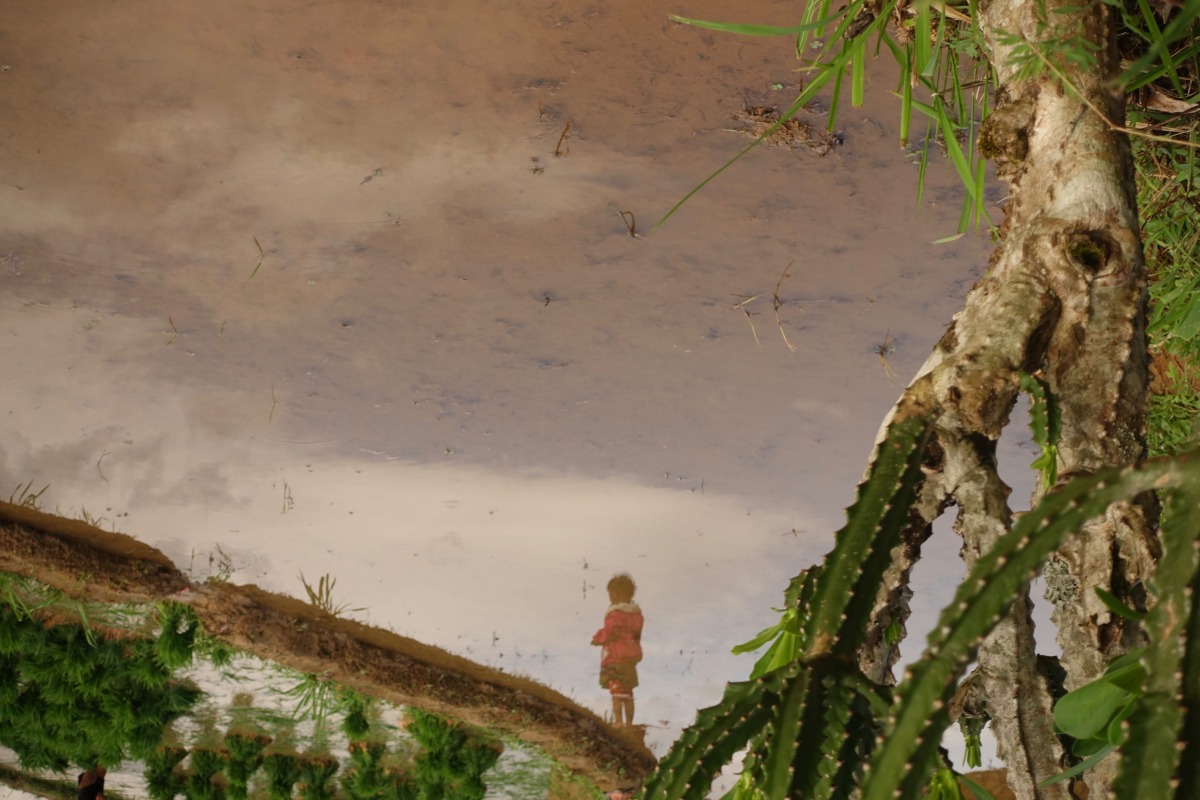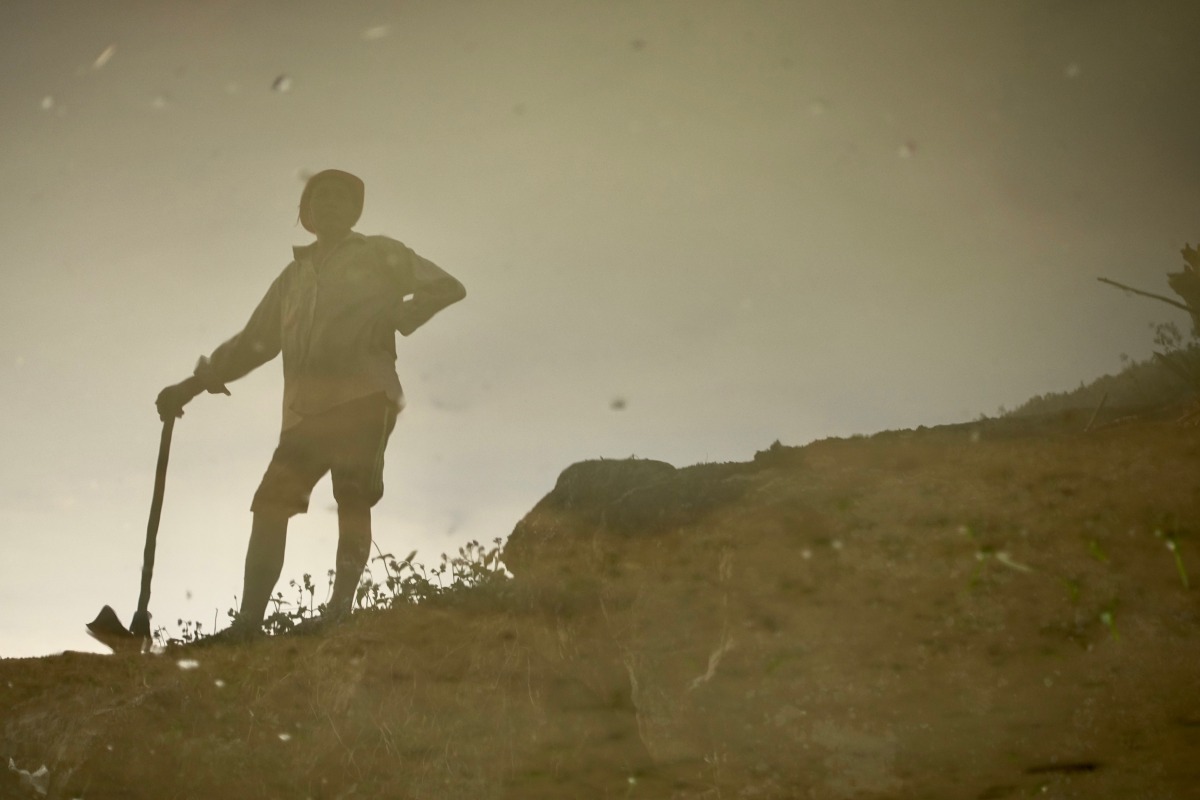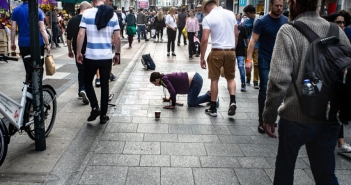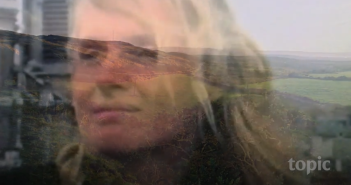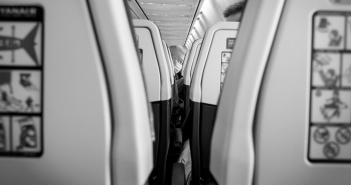Liberation
For the first time since landing I’m allowed to travel the country. My plans to go to Japan and practice Aikido with the masters are on a massive stand by. Hanoi’s fishermen are back on the landscape, monstrous exhaust clouds blurring the skies again.
My backbone feels their soggy reels, its toxic dust, and flows the fuck out.
Northwest it is, upstream the Red River—where the only breeze lives.
I jump on a bus and stay put reading Rachel Carson’s The Marginal World, the otherworldly essay that opens The Edge of the Sea, her ageless and arresting exploration of shores, and I keep dozing and breathing and zeroing myself up between the ditch and underwater eternity for six and a half hours, her words lapping my eyelids ever so softly, I can only dream I will remember them, though I know I won’t:
The shore is an ancient world, for as long as there has been an earth and sea there has been this place of the meeting of land and water. Yet it is a world that keeps alive the sense of continuing creation and of the relentless drive of life. Each time that I enter it, I gain some new awareness of its beauty and its deeper meanings, sensing that intricate fabric of life by which one creature is linked with another, and each with its surroundings.
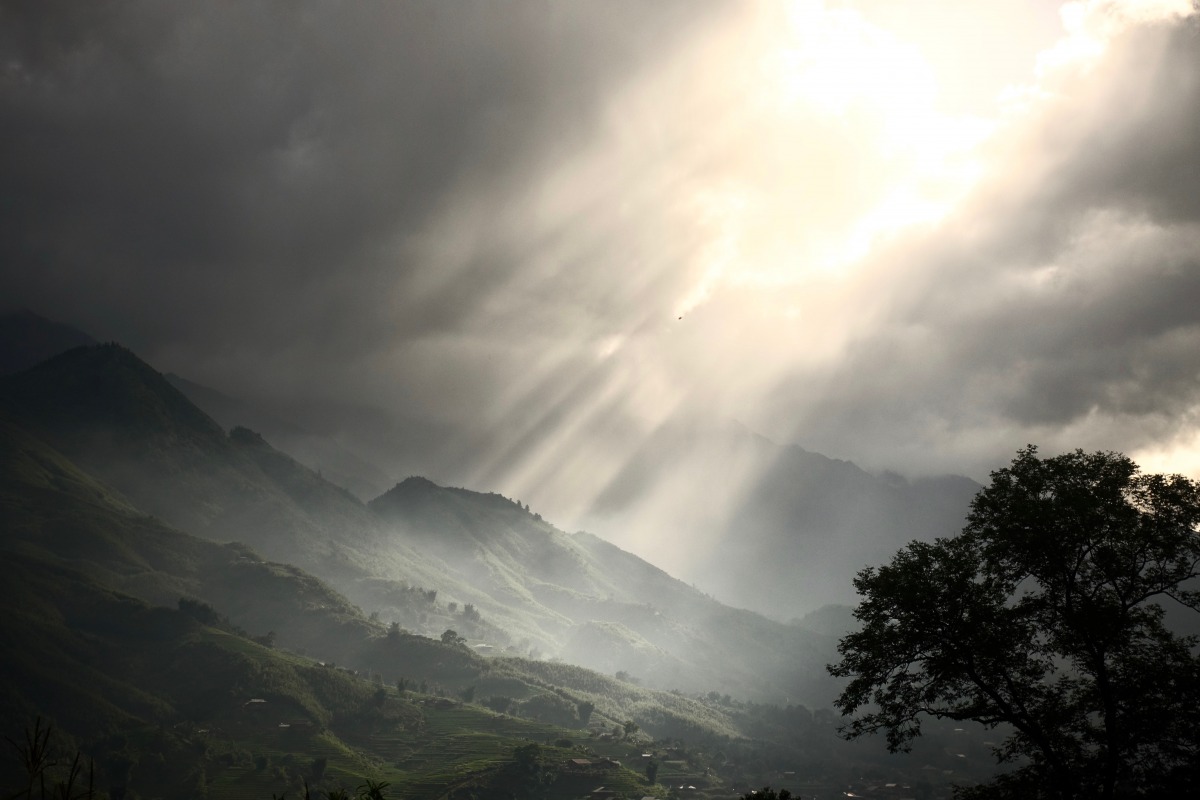
We cross the uncanny waters of the Red River, my blood rushing leisurely like its stream, its shore tumbling in plastic, motorbikes and lorry drivers spitting and braking and accelerating over its waters, fading waves forgiving the green bushes of its deadly shore. Life’s continuity seems aborted here, though millions of living cells are thriving just a few metres beyond the shore, over the eight-lane highway its magnificent current running as thick and slow as pollution.
The river gives way to a bumpy highway that would inflict some pain on Boris Johnson, running through stunning high-plateaus and flat paddy fields and dusty brown and red and green rolling knolls, until we reach Lao Cai, the capital of the namesake northern province, five hours later.
It looks just like Chaco, northeast Argentina, the Red River behaving a bit more wildly here than the Parana there, its waters even more turbid and moody, its shores receding, soon the stream will devour thousands of acres, houses and lives.
The sun is merciless and the umbrellas in bloom; the soil seems to be smoking itself, a sulphuric red and yellow smoulder coming out of the boiling asphalt; corrugated iron roofs collapsing; big empty squares with irrational monuments and massive red flags and thirsty grass and half dressed children; streets broken, stray cats emerging from its cracks with water snakes in their mouths; sellers covered under straw hats and traditional dresses combining red fur and green wool and black velvet.
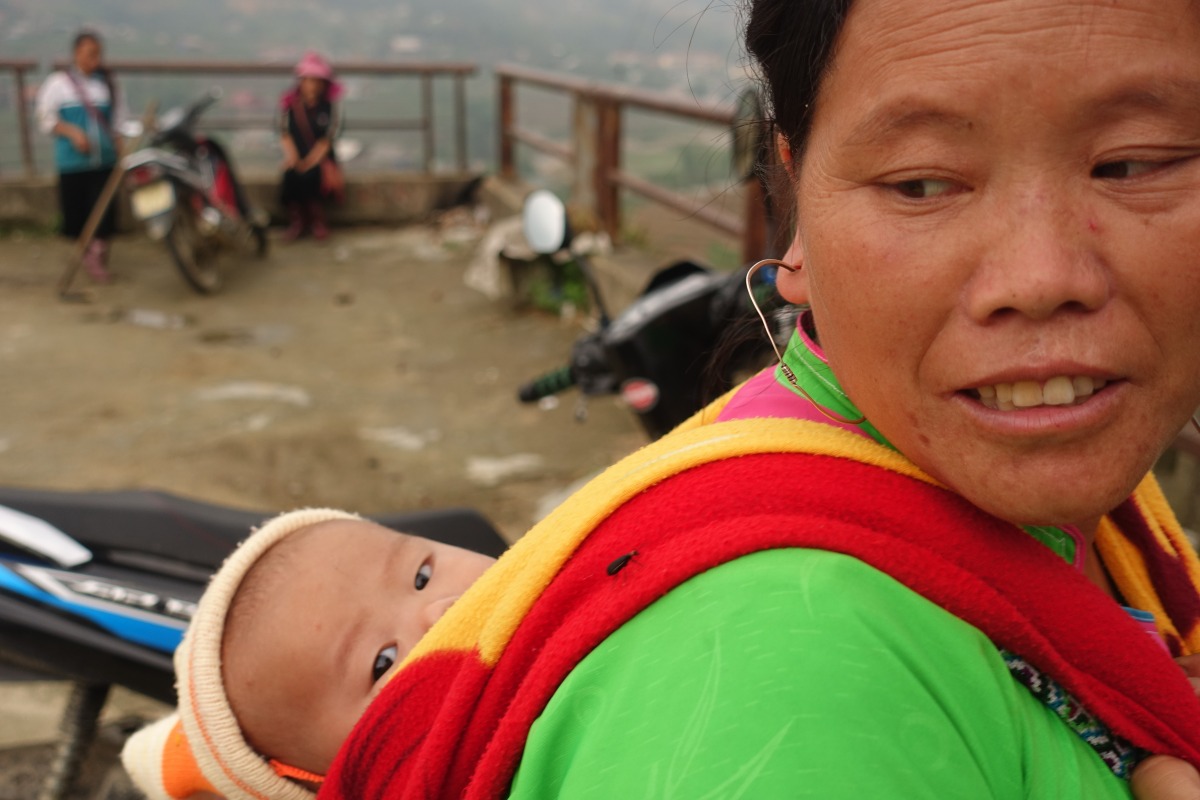
Smoked Centuries
It is my first encounter with the Hmong, I recognise the patterns and the colours of their traditional clothes; their Caucasian peaceful faces; the unmistakable smoked smiles after centuries escaping the burning thread of genocide. No coastal shore but highland wisdom.
The bus stops and unloads dozens of dented cardboard boxes full of Hanoi goodies and resumes on its way. It is now that we ascend the ramps towards the unreal.
A land of thick green mountains and brown valleys and disco paddy fields rotating like clay ceramics, forming terraced cliffs of soft angles and endless layers of water.
It is the ultimate puddle photography kingdom and the most stunning landscape I can recall, and I embrace it alongside my left hand neighbour’s soundtrack. He keeps watching YouTube videos of the best goals from World Cups of the 90’s oblivious to the existence of headphones, like most passengers.
We are travelling in time and he likely belongs to another century, though right now he appears to be the familiar Guardian sport reader trapped in the pandemic induced memory lane, a stream of old news that is almost sadder to read than watching footballers playing in empty stadiums. Most newspapers have turned the pandemic into a single obituary section, allegedly the most profitable feed in the history of journalism. They sell you your fears in order to make you feel safe… until you feel sick.
We reach Sapa after an hour, the bus advancing like a worm cutting its way through an apple in circles. It is a small town floating in the clouds at 1500 metres altitude. The French army build a sanatorium for the inevitable casualties of war dementia, and over the years other French colonizers, fancier ones, would develop the town as a spa destination, a suspended, forever misty little kingdom, its air as purifying for fighting tuberculosis as it is deadly for Macbooks today.
The town is full of empty open craft shops, bakeries, Italian restaurants, with swarms of locals taking selfies in its lake and landmarks; as for hotels and pensions I find a post office that it is actually a hotel and a couple of postcolonial real hotels that are actually nothing.
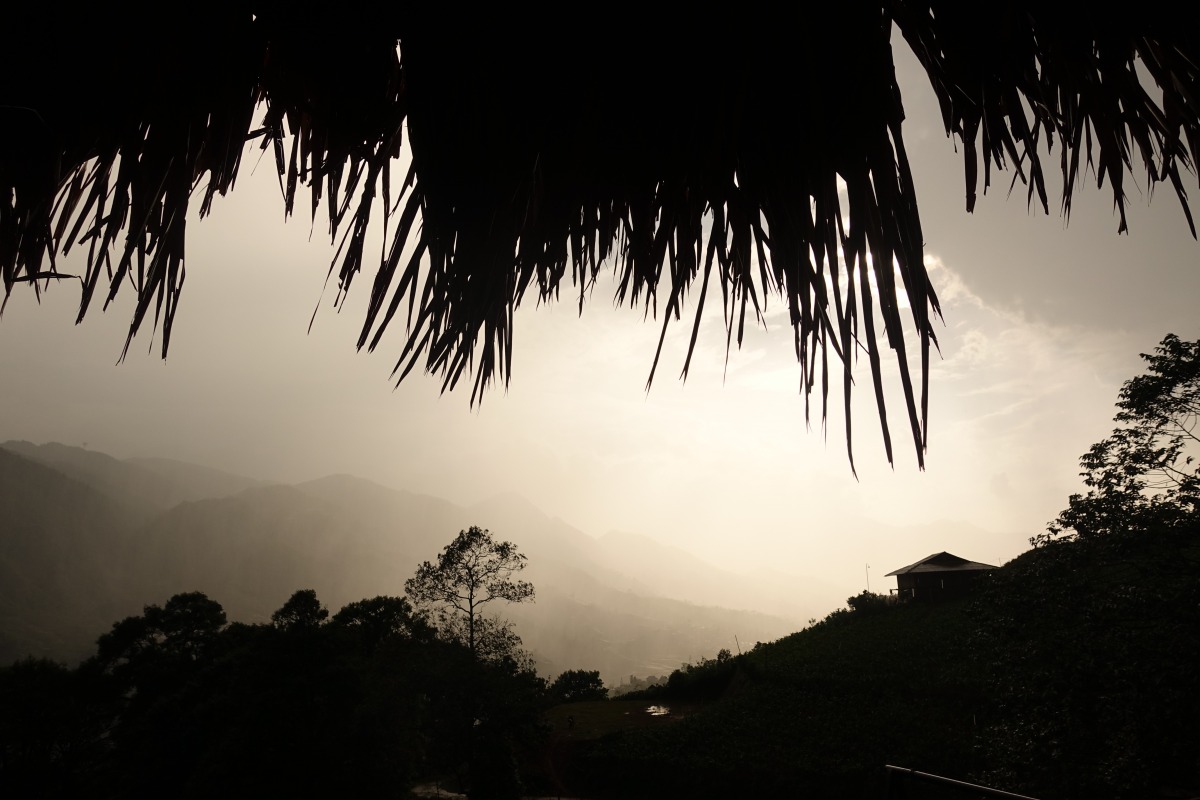
Fairground Attraction
The pension I had booked seems abandoned, its dusty hall sealed with a rusty lock, its insides like a historical chair museum: a number of seats of a number of colours stacked up in drunken heaps reaching the ceiling. I check my phone and see the confirmation I received from booking.com a couple of days ago stating that my reservation of the last room available had been successful, that it would be ready at the time of my arrival.
I seem to unmask another algorithmic fuck up, and I have no time for it.
It is dusk now and my phone is dead and my vision blurred, my one-arm glasses resting on its coffin in the depths of my dog-on-a-rope backpack. After trying a few more ghost homestays I come across a motorbike rental shop and I get myself a scooter with half a break and a cracked frame. The smiley owner suggests trying a lodge up the road. It is also switched off unlike the town Xmas lights and Chinese lanterns and the Karaoke bars and its blasting speakers trimming its unnerving neon landscape.
I see a shadow lurking in the background of the hall, and I knock. A barefoot guy in pink underwear and green tank top agrees to open the premises for my sake and offers fish, meat, eggs and opium, in that order.
I tell him I’m a vegan fish. He says opium is vegan. I tell him I’m a rehab cop. He doesn’t seem to understand what rehab is, but the cop word shuts him up like cocaine running through a platinum nasal septum. Smoothly that is.
I drop my bags, charge my phone, read about the Hmongs a bit more and get out again at 8:30 pm looking for my first meal in two days. Most places are closed or empty and it seems clear that I’m the only Westerner around, a seemingly disturbing fact for half the people I encounter. I count five kids covering their faces with their elbows as I pass by. The parents smile at their offspring’s gesture.
It is a shameful smile, another classic in the history of embarrassment, which is also the history of ignorance and neurosis, which is the history of mankind: ignorant adults and their blank smiles building the future of idiocy and racism by repeating and not questioning, the swirling ashes of habit and inheritance crushing the evolving layers before spreading, once again, the illiterate seed of nationalism.
I keep my mask on and try many more places, all of them denying me entrance until I end up scoring some boiled vegetables in a little plastic bar with an inviting owner. He is a well travelled man and tells me that the town has been very quiet since the virus, almost three months of no business. The Government promised to give some help, though he is still waiting to get his share.
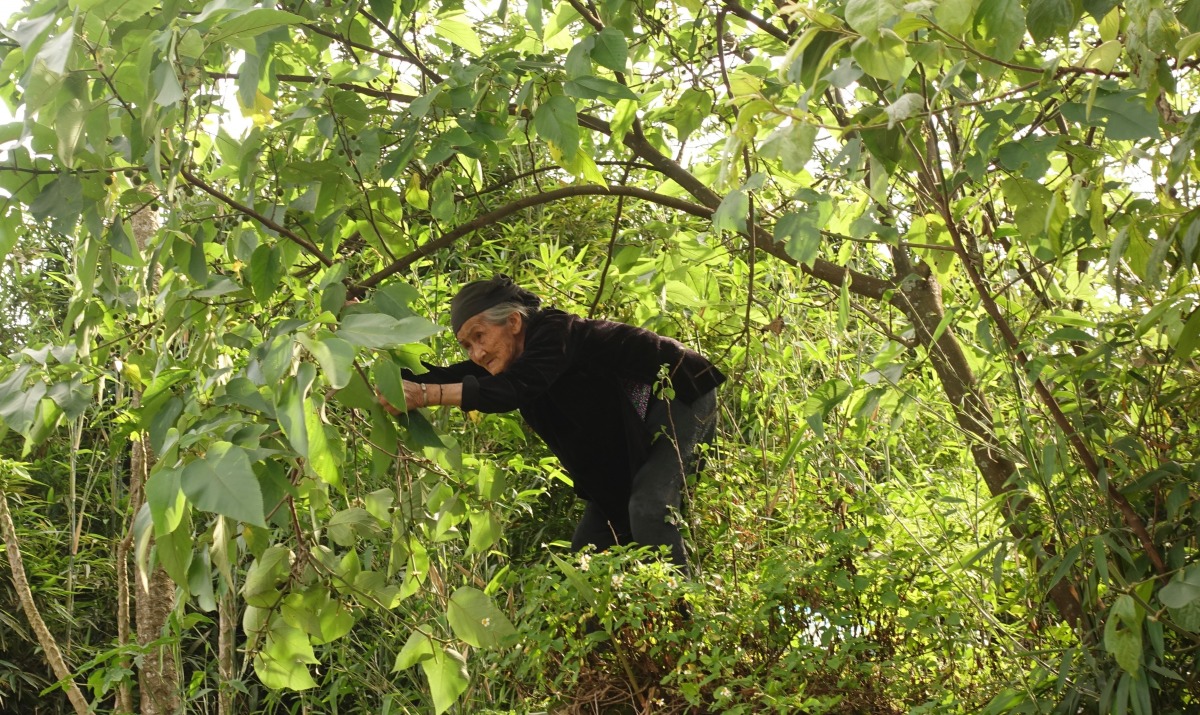
Ambulance less
It feels like landing in a dystopian fairground, a place that has been frozen while celebrating Xmas a couple of centuries ago, the blasting speakers still on, lonely, drunken voices echoing over the lake waters and the empty flashing junctions like the spooky promise of a car crash in ambulance-less land.
Sleep never comes and I stand up at 6am sharp: the Karaoke echoes have been replaced by the drilling orchestra and its seven masked performers. I can see them from my window. I pull down the blinders and realise how developed the place is. I read that homestays, hikes and fancy hotels have been booming for the last twenty years in Sapa, Chinese and Western tourists pouring dollars, euros and yens like rodeo cowboys in the last saloon on earth.
I search the map for escape routes. The mountain range is colossal and its valley spreads through many little villages from where it is possible to take a number of hikes. I book a homestay on top of a side road, set up Google Maps and drive towards it. It is an eight-kilometre distance that takes me an hour, quietly descending the broken road I ascended on the bus. I keep stopping to take pictures, amazed by the canyon, its dramatic waterfalls and terraced cliffs. Eventually I reach a panoramic point that overlooks the valley, its edges rounded by paddy fields and its bottom crossed by one shy river. The hills are massive and one of them imposes itself over the rest like an overweight Buddha. It is called Fansipan. It is fancy, and also the highest in the country.
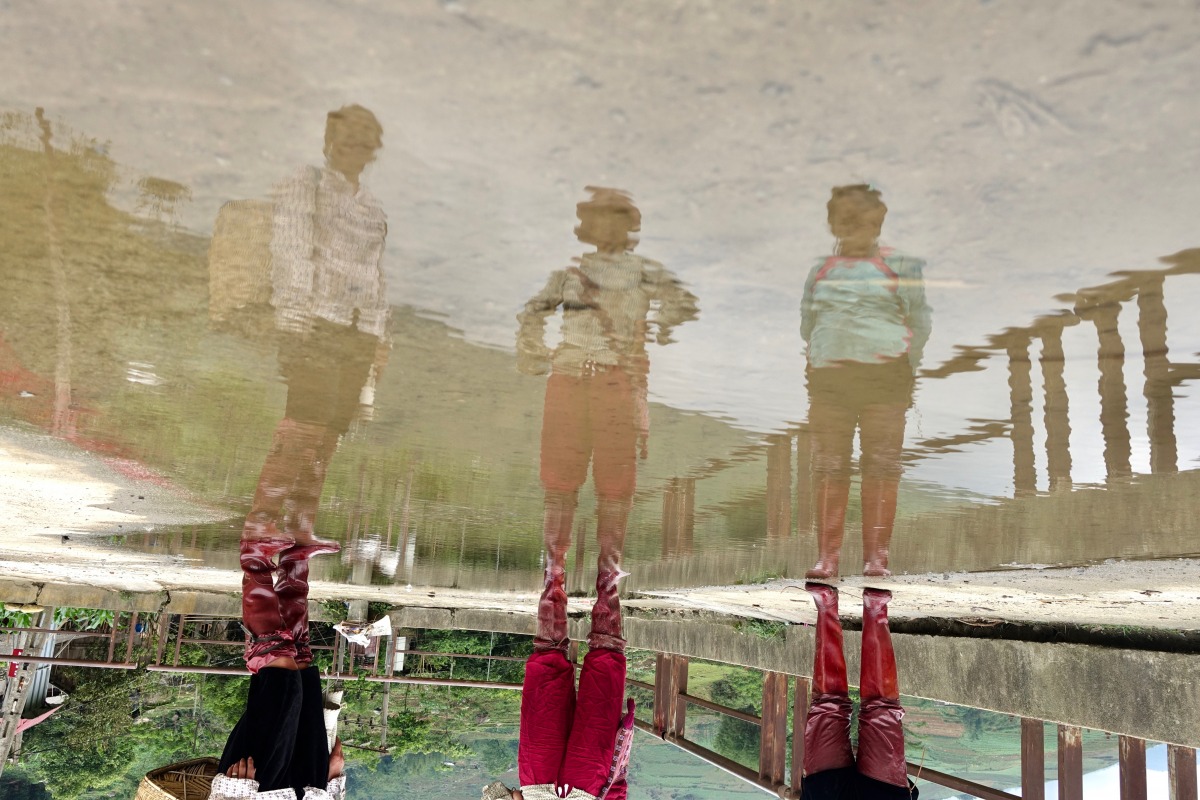
Catalonely
I find a puddle esplanade and I’m taking pictures of its reflections when three ladies dressed up in Hmong traditional clothes wave at me, big smile on their faces. I say hello and one of them asks the most boring question, though she does it without any hint of mistrust.
I tell her I’ve been here since the first flood.
She considers my spine —almost disguised by my skirt.
“Where do you come from”?
“I was born in a Mediterranean puddle”
She smiles now.
I tell her I’m CatalIrish assuming she won’t understand.
“That is some strange combination”, she replies in perfect English.
“I’m from Barcechina, but haven’t lived there for a while. Been in Indonesia and Hanoi for the last few months. What about you, your accent sounds English”.
“Oh thanks, that is nice. I have never lived abroad but I try my best to learn. I was tourist guide, so I’ve been practicing the language for a while”.
“Since you were born by the sound of it”
The three of them smile and the pale sunshine breaks away biblically, a sudden mist silhouetting us against the moisturised evergreen valley.
“It is good to see your face. We haven’t seen faces like yours in three months”.
“Seriously? I might have a unusual face”.
Triple cracking laughter. Plus my smile.
After last night’s looks this is music to my ears.
We exchange names. The three of them are wearing long and lustrous red leather boots oblivious to the mud.
“Are you working in the paddy fields?”
“Since Corona, yes”, replies Bha, the spokeswoman.
I wonder how hard that might be.
“It is not hard. It is family work. I did also help while I was a tour guide”.
She is of strong complexion and large smile.
“What do you do?” she asks.
“I use to work before Corona, I’m mostly a puddle photographer now, and I write now and then”.
“What about”?
“Perhaps about you”?
“Why me?”
“Because it is happening. I only write about what happens.”
She smiles again.
“What do you mean by puddle photographer”?
“Shall I demonstrate”?
“Yes.”
I kneel over a puddle and start shooting them, their reflections mildly distorted by the wind, the boots shinning like the dream of a crushed empire, likely next door’s one.
We exchange WhatsApp numbers erratically, the blinding light delaying my performance. Eventually Bha extends me her device and I see my name and the picture I uploaded to my Tinder profile last week. I wonder how the fuck that picture has ended up in a Google search of my fake name. Only then I realise that this is not an algorithmic fuck up, but a rather fucking smooth Google Facebook operation.
I resolve to erase all my profiles once I find the homestay, but then I’d lose her smile and the possibility of a coffee and her story.
I jump on the scooter and resume navigation. I’m über conscious of satellites orbiting around my coordinates, my embarrassing profile shot spinning around the Earth, the Orion shores and Barcechina’s morbid tides, exposed and shared like any other bit of privacy we dreamt of achieving only a few weeks ago. I can’t get over it.
At this stage it seems clear that the invisible massacre is going to keep fast forwarding the ultimate step of our alleged evolution: from Homo Sapiens to Homeless in the Clouds. I can relate to that, no problem, been surfing evictions in growingly draconian manners since I was eighteen.
I was aware of the non-existent nature of my data privacy way before landing, but this is my unmasked encounter with the eerie work of State reaped algorithms. I keep producing ridiculous amounts of free labour for those who are virtually enslaving me before selling my data to ancient regimes for fucking millions.
I long for my infinity pool, those dataless days, where tracking your movements would, at least, have required some fucking effort. On those indulgent, forever-high days, just a bit of crawling would get you to places.
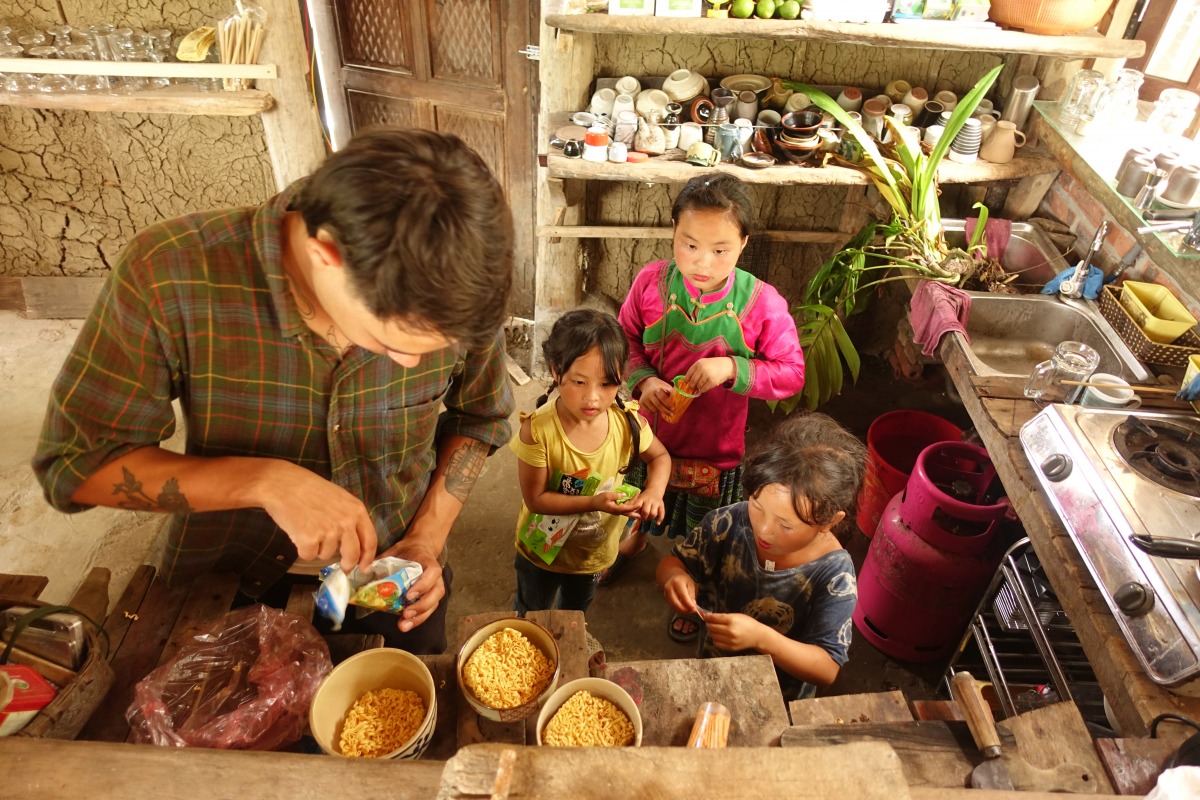
Lilly May
She is six-years-old. Her name is not Lilly, though it means Lilly in Hmong. Her fingernails are darker than her features, same as her t-shirt, forearms or knees. She wears ragged clothes much older than her and the carbonised particles living on her head allow her to perform all kinds of granitic hairdos. Lilly can speak English, Hmong, French and Vietnamese, and every time I speak to her in Catalan she seems to grasp it effortlessly. Somebody told me once that Chomsky learned Catalan while on a train journey from the south of France to Barcelona. It is some short distance, though as it turns out Chomsky invested less than ten minutes to the task… while on a tunnel.
Lilly is playing a banjo that is almost longer than her. She has it resting on her lap. The banjo belongs to an intrepid young poet who rhymes in Shakespeare’s language over mandolin, bodhran, banjo, guitar, or whatever instrument that falls into his hands. He is a self-taught wild player and a writer on the rise who could be the unlikely offspring of Laurie Lee, Hazel Court and Shane McGowan.
He calls himself Lock.
Lock is suggesting Lilly stop banging the instrument against the floor while grasping its large neck. Lilly apologises and balances it again on her lap. The sunlight outlines her funky dreadlocks, just a few of them, growing disparagingly, holding some grudge against the imposing nature of the sudden beams on them.
The chords vibrate slightly and produce a dream-like minimalist sound that would give John Cage some pleasure.
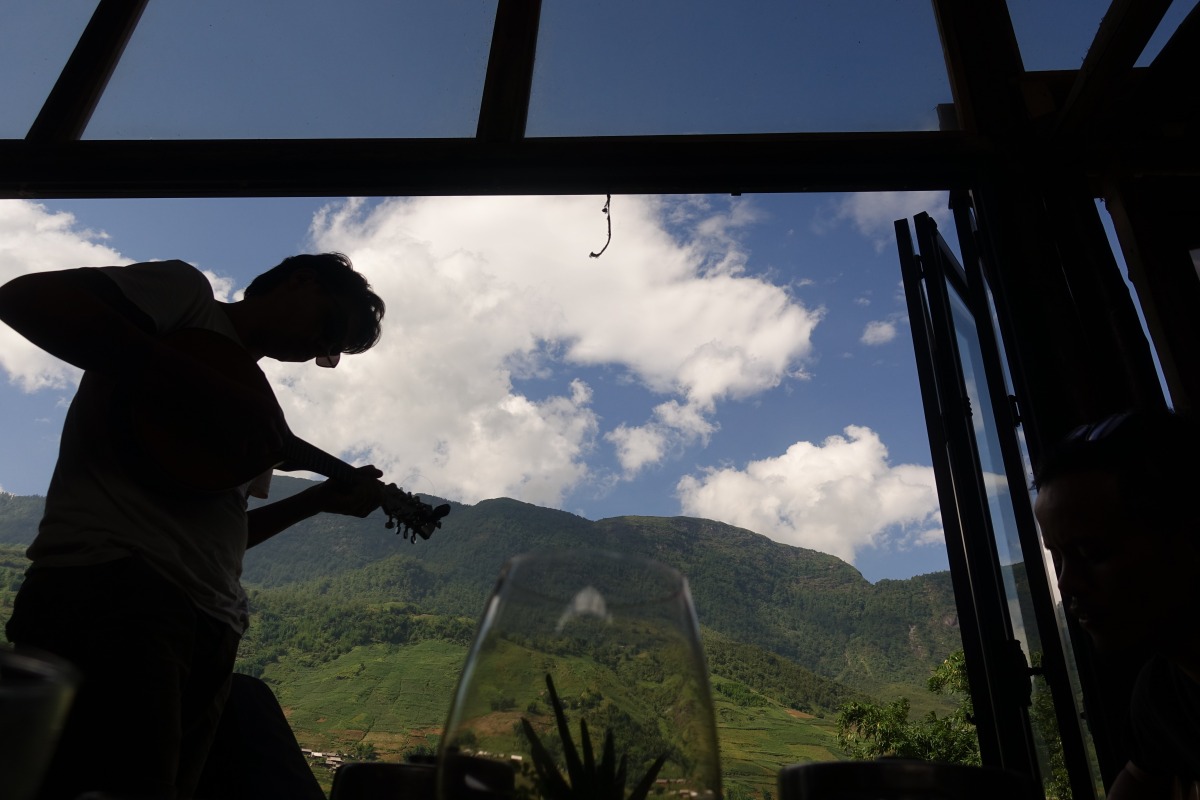
Leave Space
Maggie Nelson recalls in her essay The art of cruelty the life struggle of a musician trying to free himself of his surname, which is also a metaphor of his stance as an artist: ‘The most, the best, we can do, we / believe (wanting to give evidence of / love), is to get out of the way, leave / space around whomever or whatever it is.’
Lock is giving Lilly some space though he will try to protect his instrument while sharing it with her. Perhaps that is why he now decides to add an old dusted fiddle to the performance. Lilly swaps instruments and remains transfixed by the fiddle as if talking to its soul, without any sign or intention of playing it.
Lock says that a few weeks ago he witnessed Lilly beating the shit out of a bunch of expats after they explained to her how to play a certain game of cards.
Lilly seems oblivious to her genius and reluctant to please her audience, which is only me. I ask her to play something. She considers me with tedium and concludes the inevitable: I don’t deserve it. She tells me to come back tomorrow and resumes her telepathic fiddle communication.
We are inside Lock’s bar and residence, a room resembling a Western saloon that oversees the opposite side of the colossal Fansipan mountain range, its backyard facing a sculptured paddy field descending the valley, then raising, until ticking the oblivious toes of the fancy range.
Lock built the whole place with his business partner just a few weeks before lockdown. He has a fully stacked wooden bar and a library running along its back wall. George Orwell, Laurie Lee, the unbearable Patrick Leigh Fermor and a few more writers I had never heard of living on its shelves. I’m the only customer, a one-man audience, reader and drinker, though Lock and I could make a habit of getting nicely locked over the coming weeks? Months? Years?
“The bench you are sitting on. Do you know what that is”? Lock asks me.
It sounds like a question Magritte could have asked Gertrude Stein. I wonder if the bench is a bench is a bench is a bench.
Lock tells me it’s a coffin.
I smile.
I’m seemingly alive.
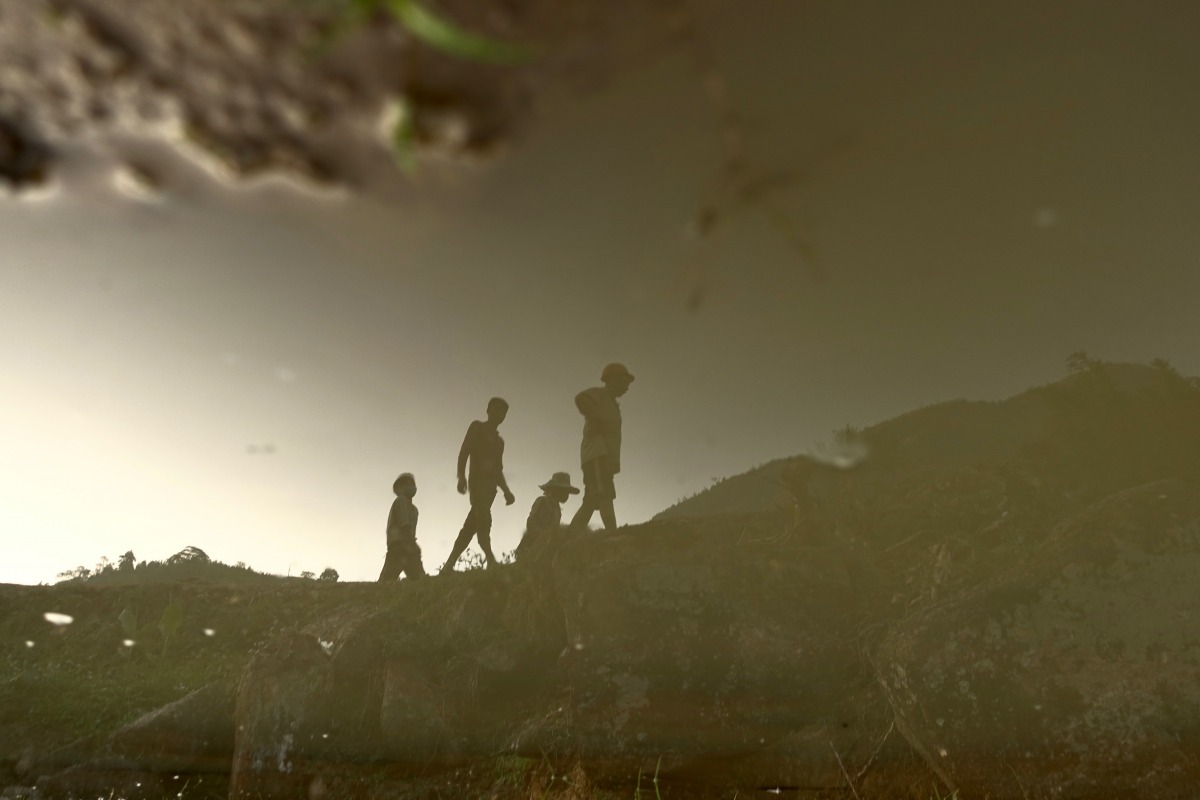
Before Lilly May
On my fifth day on the high-plateau I seem to have come up with a little routine. I spend the days reading and writing, eating peanuts and watermelons and pineapples, drinking coffee and then tea, which is the outstanding way of drinking coffee in Vietnam: for every coffee you order you get a little glass of green tea. It is a remarkable way of avoiding the inevitable depression after the intake.
And then, around 5pm I get my camera, jump on my bike, wander around and stop in whatever appealing places I can find; then dismounting, start taking pictures and try to talk to whoever comes my way: who are mostly members of the Hmong.
The Hmong (a word that translates as human beings or free people) are one of the five ethnicities living around the stunning Sapa Valley. They are spread over the mountains of Laos, Thailand, Burma and Vietnam, fleeing extermination at the hands of the Qing dynasty toward the end of the 18TH century, though they had been under attack for over five thousand years. The Chinese failed to consummate the genocide of the free loving tribe, though they would claim to have succeeded by displaying the beheaded skulls of some of their leaders on spears. Until then, the Hmongs had been settling around the Yellow River, always on the move, adjusting their nomadic lifestyle to the fertility of the changing soil. Their ancestors travelled a long way, in all likelihood from the Siberian and Caucasian highlands. Their nomadic kingdom stands now as a free fortress built over paddy fields and dizzying heights where water buffalos, chickens, snakes and pigs pace around like utopian cattle.
Today on my fifth day I set off to a Hmong village after 5pm. It is a ten minute ride across the green dam that I can see resting on the bottom of Fansipan from my bungalow. The ride is quiet and the sun is lowering fast. I encounter a family labouring on the paddy field before the dusty road that leads to the colossal dam bridge. I dismount and try to engage in conversation with a Hmong lady walking the ditch. She could be a passer by or the matriarch. She might well be the same age as Mumruinho, though she looks like she could be her grandmother; that is, my great grandmother.
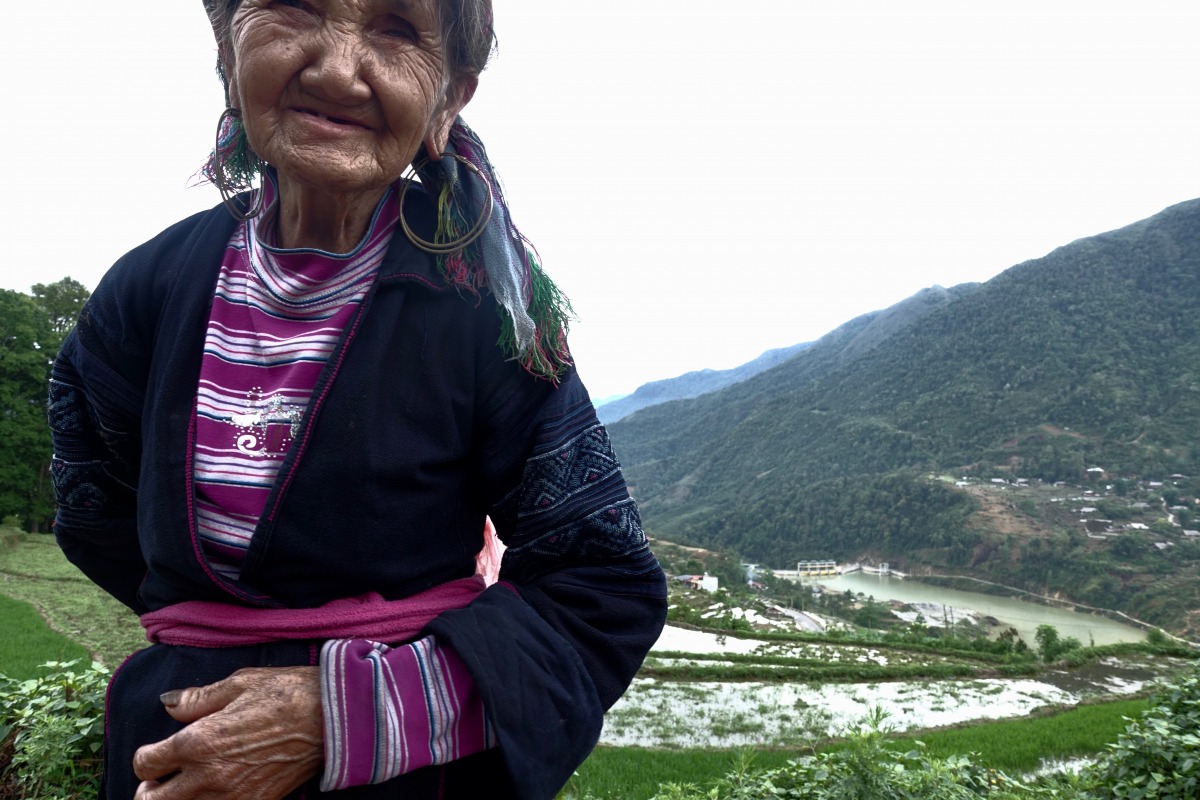
Every Old Man I see
It is one of the good things of being a Folded Arms orphan: every old person you see could be you grandfather, if not your father or your great-grandmother.
Patrick Kavanagh wrote it first.
Every old man I see reminds me of my father.
When he had fallen in love with death.
One time when sheaves were gathered.
That man I saw in Gardiner Street.
(…)
It still happens to me though the more I look myself in the mirror – something I try to avoid – the older than my father I am, which is aberrational: I’m almost three years older than him when he died.
My sudden great Mumriunho has a single tooth and a smile that seems wider and greener than the goddam dam. We stare at each other. She is smiling all the way. I smile all the way back.
Eventually she makes a shape using both thumbs and index fingers. She is clicking. I offer her the camera. She takes it eagerly and points it at me. I tell her not to, please, anywhere but me. She understands and clicks the sunset. I suggest she takes a self-portrait, which is unfair. She declines by pointing at her lonely teeth and performs the same eyebrow-arching routine I’ve been performing all my life.
Her fingers are slim and her nails flat like mine and Mumruinho’s. I grab her free hand and extend my fingers to compare the size of our palms. She likes that and seems impressed with the symmetry.
The sun is exploding on the green waters now and arching flashes on our faces that might have never looked more Oirish. It is astounding. I’m tempted to take a selfie though they are like cheese or chicken: something I try to avoid inflicting on myself.
After remaining smiling for a while her fingers point towards a little house before the bridge. I tell her to come along with me, but she starts walking in the opposite direction. Only then she turns around once more and makes another shape with her fingers, her left palm extended, all its fingers involved now as if she were holding the skull of a little kid.
She smiles and points again to the house and walks away.
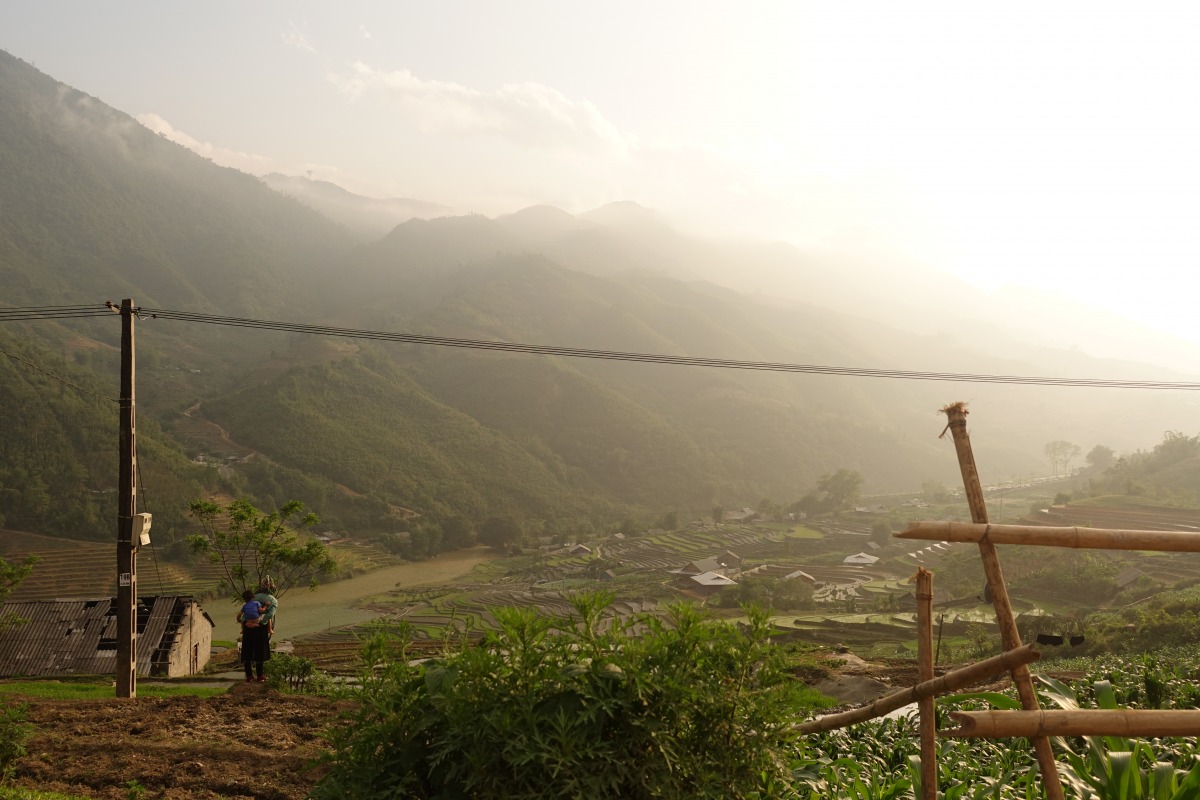
Eagle Snake
The house is only a ten minute walk away. The dam waters are purple now, its surroundings devoid of trees except for a bunch of willows conjuring the end of the world, tracing wrapped X’s with their branches by its dusted shore. I get close to the brown waters and the trees and take some shots of its reflections, a paddy field family bending their spines in the far distance, across the dam. There is a long branch resting by the shore and I crouch and take it as a walking stick, its crust pierced and layered by the lazy lapping, plastic twirling around its edges, mould whispering the memory of an ancient stream that has inevitably decayed.
I’m standing against the light, the distorted willows providing some shade, a few broken layers that seem to replicate great Mumruinho’s fingers. I wonder how the willows can grow here, the soil is strewn with dirt and rubble, and I conclude the dam waters might provide some irrigation.
I’m considering this when a mighty snake uncurls itself from one of the branches and performs an eagle-like offensive: it flies into my face. I elude it with a swift tenkan, and when it is ready to counterattack I sway my truncheon and stick it between its eyes.
It is my most accomplished Aikido movement in a decade, though it does not seem enough to kill it. Her brains are inside her fangs now, and I start trotting away, my adrenaline filling the dam like a million Alka Seltzer tablets.
As I run away I see a shadow coming out of the house. I wave towards it and the shadow waves back and proceeds to walk towards me. It belongs to a young kid of seemingly Hmong features.
Hmongs believe that killing snakes brings bad luck, only hunters are entitled, and I’m not one just yet. They also believe that if one manages to sneak into your home somebody in the family will die.
I convince myself that the shadow hasn’t seeing anything, and I entertain myself thinking that I might remind her of her father. The shadow could remind me of my lack of offspring… and eventually it will.
It seems to be a friendly shadow. It gets closer and smiles. She starts another finger-based conversation and offers to take a picture of me. I brand an X across my face and smile. I offer to take a picture of her and she seems to like the idea.
The shadow is wearing an old green uniform much older than her: her grandpa’s uniform perhaps? She definitely reminds me of her ancestors: I can picture a lineage of bridge sentinels. The shadow arranges her outfit proudly and stands on top of a boulder: the colossal bridge behind, the sun in her face, all over the uniform, my shadow on her way.
I position myself at an angle and shoot a few times. The light is heavenly and I can’t help but ask her to try a second location, just a few steps ahead. This time the sun is on my face and she is the creeping, redundant shadow. I shoot six photos and she calls it a session after stepping on the snake’s corpse. I finger tell her that it was my fault. She thinks I want to take a shot of the corpse. I tell her not and a second afterwards she grabs it and makes the universal eating hand sign.
Yummy.
We exchange emails and I agree to send her the photos. She seems real happy. She is carrying a small speaker in one of her many trouser pockets. She is listening to some reggaeton aberration, until the music stops and Dylan comes in, his crackling voice seemingly broadcasted from a remote planet. My jaw drops, my heart explodes. We sit down and listen.
I’ve just reached a place
Where the willow don’t bend.
There’s not much more to be said
It’s the top of the end
I’m going
I’m going
I’m gone
I’m closin’ the book
On the pages and the text
And I don’t really care
What happens next
I’m just going
I’m going
I’m gone
I been hangin’ on threads
I been playin’ it straight
Now, I’ve just got to cut loose
Before it gets late
So I’m going
I’m going
I’m gone
Grandma said, “Boy, go and follow your heart
And you’ll be fine at the end of the line
All that’s gold isn’t meant to shine
Don’t you and your one true love ever part”
I been walkin’ the road
I been livin’ on the edge
Now, I’ve just got to go
Before I get to the ledge
So I’m going
I’m just going
I’m gone
I can only wonder if when I’m gone, whether this might be my last shore. I’m crying. I get ambitious and try to explain the story of my recent encounter with her grandmother, who could also be my great-grandmother if not Dylan’s granny. It involves many fingers trying to emulate different sizes, a syncretic effort in genealogic trees and Bob’s visions. She smiles and performs an eyebrow routine that turns us into sisters. I point at my mouth and try to illustrate an almost complete lack of teeth. She smiles again and says something and then points at the other side of the bridge with her index finger and makes the finger click sign.
I set off towards it.
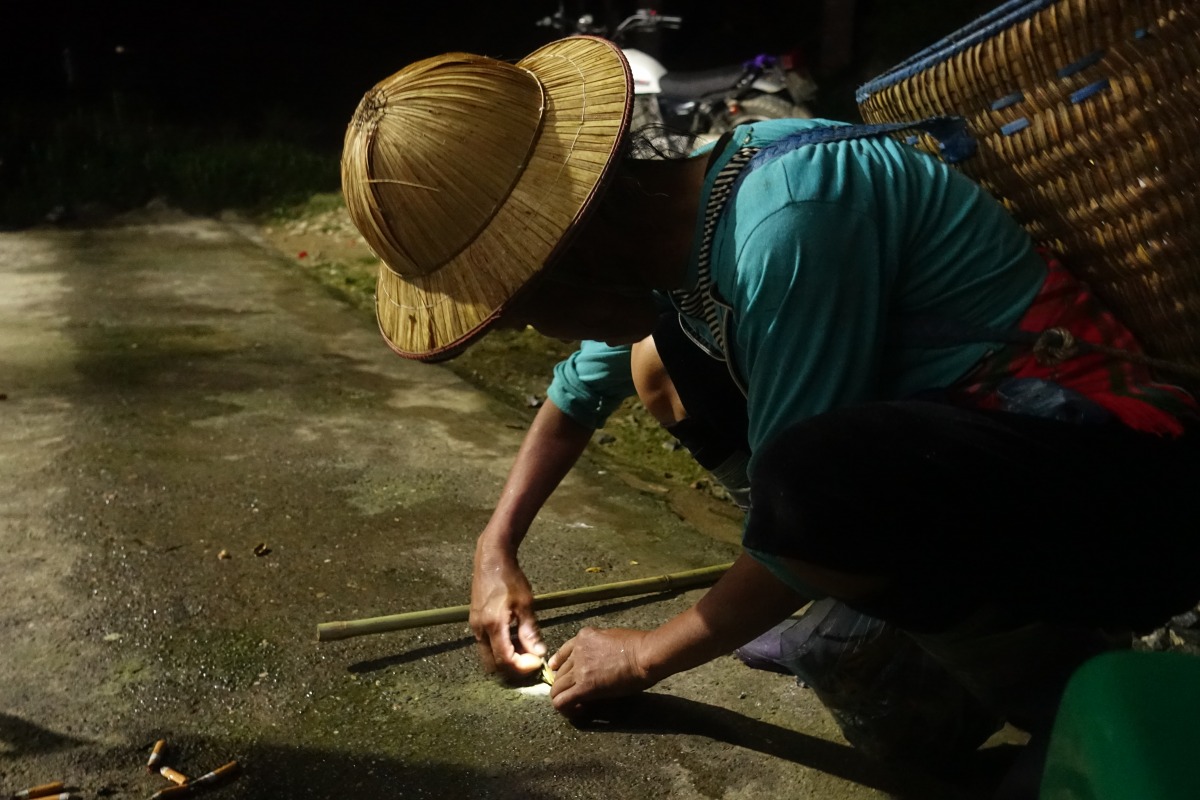
Seven Eleven
It is my seventh morning here. I wake up after another mighty dream, which seems to be the nature of my oneiric life since mountain landing. In the dream I’m hanging out with Trump and another evil motherfucker in one of Dublin’s corpo-fucking district hotels, by the Samuel Beckett’s bridge.
It is weirdly sunny and Trump is inside the hotel room and I’m outside on the balcony and the sun is setting and the blinders have covered Trump’s hairdo abhorrence and the light is filtering through it and the coiffure becomes a magnificent muffin pump up with gold. I take a picture of him across the window and he, Trump, comes out.
He seems a likeable character and tries to engage in conversation. He asks me what worries me the most. Next thing all the office buildings surrounding us start collapsing, Facebook, Google, Airbnb, you name it. He seems oblivious to it.
I answer Property Fascism and I can’t help but blame him for it and smile at the phenomenal demolition.
He seems disappointed. He tells me that if I like Proudhon so much I should let other people come and live with me. I wonder how the fuck Trump knows about Proudhon and I consider property and realise that the hotel we are hanging out in is actually my house. It is a dream house quite literally.
Next thing I’ve kicked him and the other motherfucker out. Then somebody knocks at the door. I’m writing the most inspired poem of my life, an ode to Rachel Carson, who was born the same day as my grandmother, and I ignore the bells. Then I realise that a little kid has sneaked in and I get pissed off and go and tell him that he can’t sneak into my house like this, particularly when I’m working.
Immediately afterwards I feel guilty in some tripolar fashion: I’ve embarrassed the kid, myself and poetry in one go. Trump will be proud.
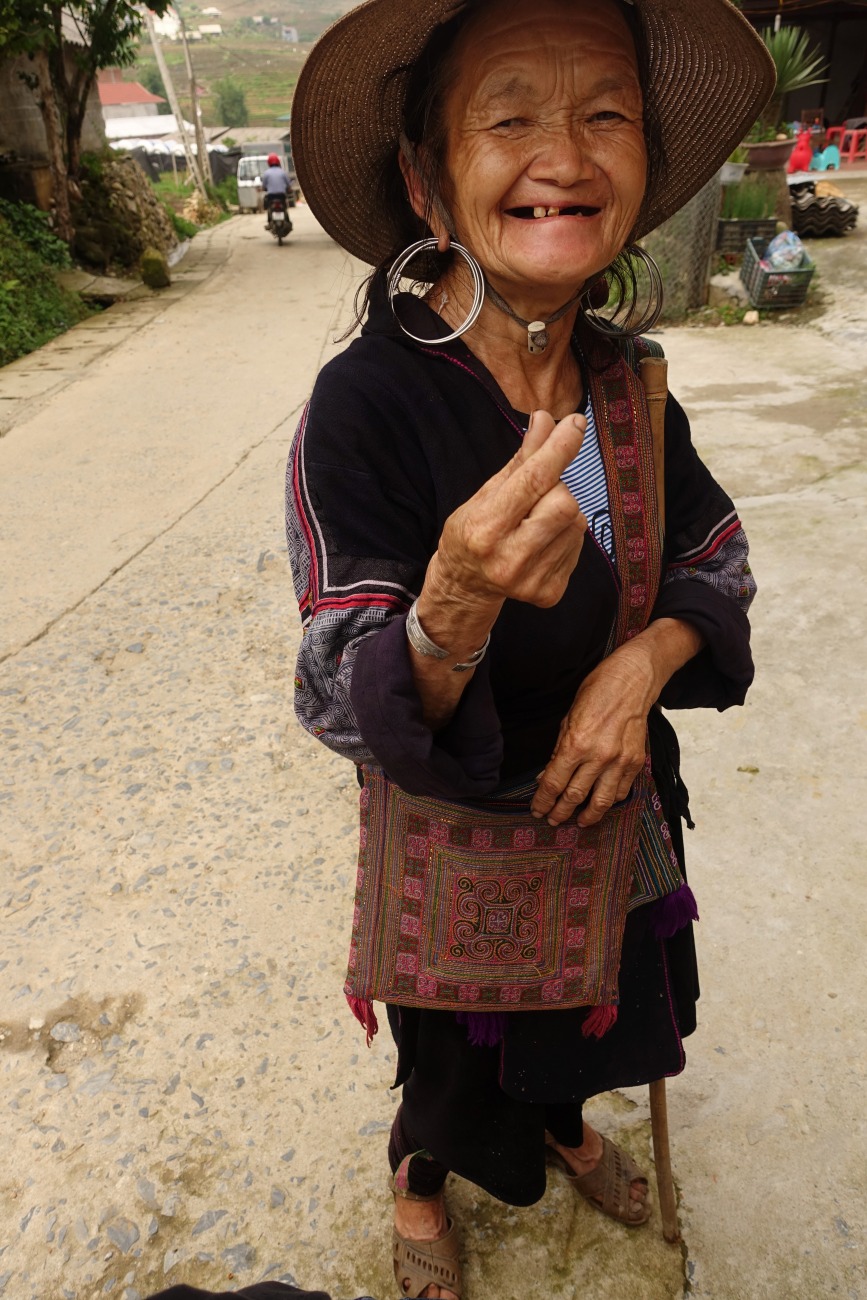
The Never-Ending Smile
I open my eyes and I’m not dreaming anymore though I’m living the dream, sprawled on a king-sized bed overlooking the hills. A cloud in the shape of a dragon seems to be resting on the far edge of Fansipan. I wash my face, get out of the bungalow and walk down the garden towards the kitchen. It is a five dollar per night eco-lodge, breakfast included. I am the only guest. It is some real life dream. Since the invisible massacre prices have dropped down so much that I can almost live like Trump now; offshore that is.
As I’m opening the kitchen door I see a silhouette past the front gate, by the ditch of the road. There she is. Dylan’s granny, my great grandmother, her lonely teeth filling the valley, the morning, our eyes, the whole sense of belonging. I wave at her and she smiles back and keeps smiling. I walk down the stairs and say hello.
She starts finger talking while maintaining her smile. We might be stuck in finger grammar. She points at me and finger clicks.
I finger tell her to wait for a second and run to my bungalow, take my camera and come back. Now her fingers are producing a new sign. It is actually a universal sign. Rubbing the inside end of your index finger with your thumb. Even Trump would understand that.
I smile back and imitate her. Then she stops making gestures altogether and remains on the ditch, just smiling at me. It is by far the longest I’ve ever been staring at someone who is smiling back. I can recall many situations when I stared smiling at people who were not smiling back at all. I was young and angry. They were old and angry, mostly journalists.
I offer her a coffee.
No.
An apple.
No.
To come in.
No.
She just keeps smiling, the ditch is her shore and my offering its breaking waves. I keep smiling back and then she tries to talk, but can only produce broken sounds, half of her body is shaking awkwardly while doing so. I draw closer, wondering if she is ok. She keeps smiling and starts walking away dragging her left leg, shaking her shoulders. I wonder if she might have had a stroke after our first encounter, and conclude that I was the one stricken. She was probably like that all the time.
We exchange a fingered goodbye and I see her disappearing gently through the blushing rice fields and the long and bushy corn plants until the winding ditch and its floating clouds swallow her completely.
I get in the kitchen. My landlord isn’t around. I almost miss him. It is some feeling, one of a rare kind.
He is the skinniest man I’ve ever known. He eats dogs and cats and pork and rice: every bite he takes the thinner he gets. His smile reminds me of the smile of my great-grandmother, which somehow reminds me of my father’s and Rachel’s smile.
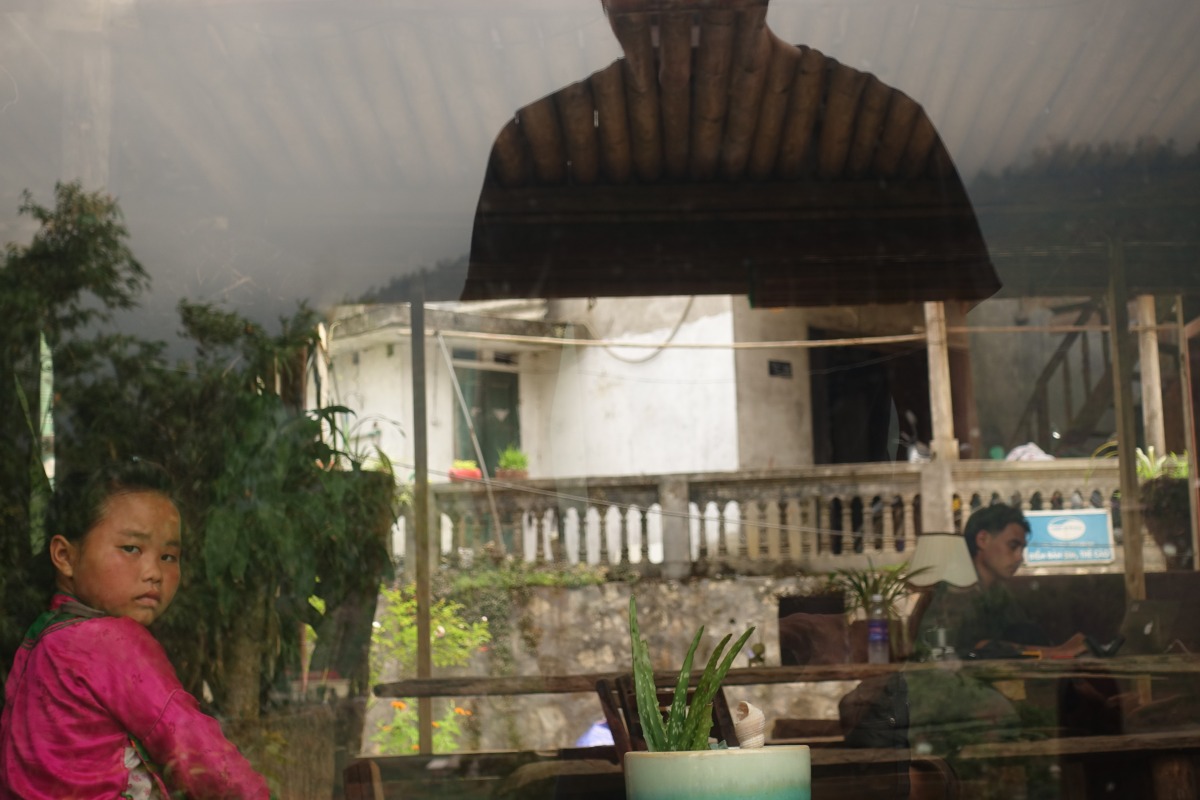
Dreams Never End
I’m daydreaming. I’m blessed and grateful to be alive. Clouds travelling like steamed up scratches before my eyes now, the paddy fields gleaming, its puddles calling, the whole world ending, while this corner blooms.
My phone flashes. Lock invites me over for a coffee. I’m a radiator now. I take a shower, pack my backpack and jump on my scooter. It is another ten minutes ride, the winding road bringing puddles and clouds and tin houses and little mud-spattered kids under massive colourful umbrellas, shepherding buffalos and avoiding the sun and the rain of this subtropical highland ever so gently.
I surf the clouds with my handlebar and sail the mighty holes of the broken road that separates my town from Lock’s; Boris Johnson getting abused with every shake.
I can’t remember the last time I was on my way to meet someone I’m looking forward to hang out with. As I approach Lock’s village, I bump into my great-grandmother. She keeps sailing her shoreditch. She is walking and shaking. I stop the engine, take off my helmet and her smile takes over the mountain range.
I dismount off the bike and approach her and we hug.
It is the best hug I’ll ever get.
A fucking ocean.
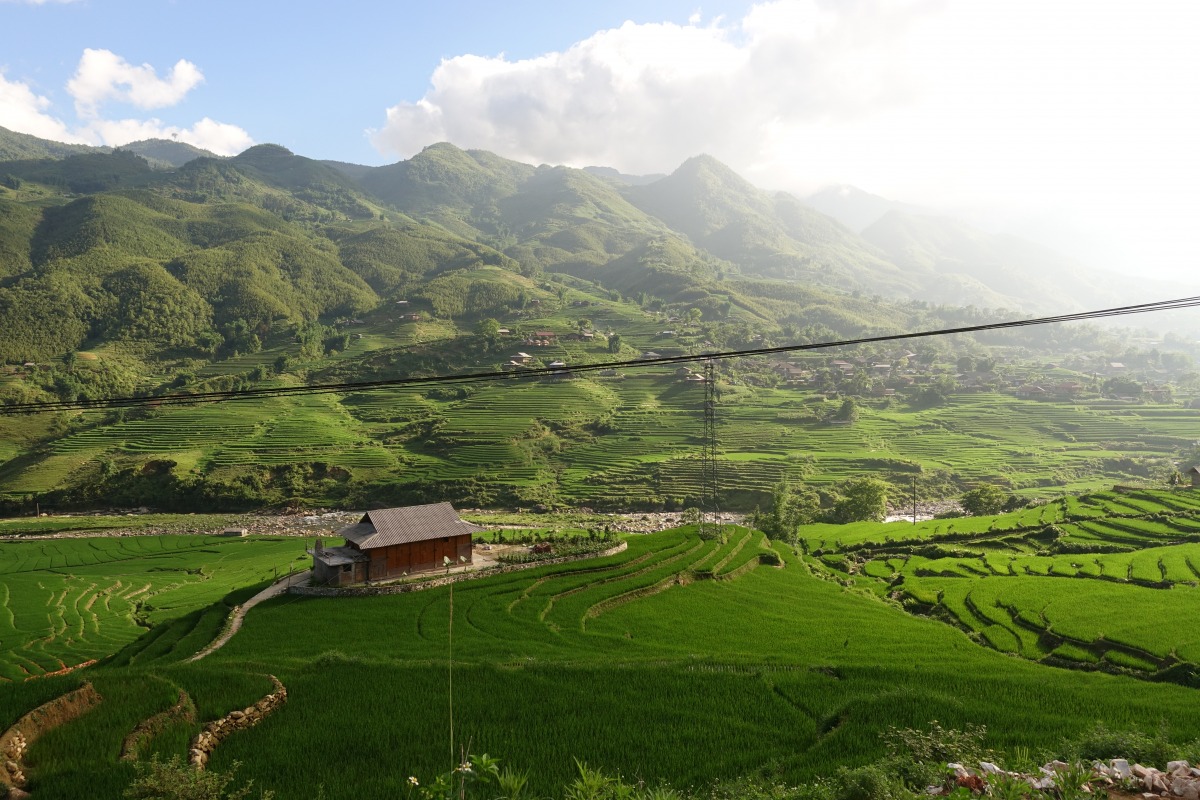
Ho Chi Minh
This is before Lock. Time lapses and overlaps once the shore and the waves meet. Continuity goes backwards and forward, upside and down, like my open mouth and my galloping heart.
After leaving the sentinel shadow behind I cross the dam bridge. It is goddam steep. Feels like Moses traversing the brinies. To my left hand side there is a ravine flushing its waters over pointy rocks and vertiginous treetops, the horizon narrowing and growing farther like a rattlesnake on the run. I feel the dizzy spells. I look upfront or to my right-hand side, where the sun is setting behind the paddy field where I’m setting off to, the electric waters flashing otherworldly echoes that I fail to capture.
The same family is still perched on the plantation, their rubber boots covered in mud, their scythe’s lowered and rusty, a buffalo couple waiting and flirting on the side of the road, its legs equally covered in mud, a psychedelic pink outlining the raw flesh on their buttocks: it is an indisputable fluorescent take on Boris Johnson’s double chin.
I climb the little stepped hill, I finger my hello and the four members finger back at me. Father mother daughter and son, I presume. The sun is rubbing the edge of the hill, the dusk turning the paddy fields into silver puddles edging the rim of the world, the family shadows projected on it, sharp rice stalks forming a calligraphy seemingly inspired by Rachel’s take on puddles, which is as good as puddle literature gets:
Under water that was clear as glass the pool was carpeted with green sponge. Gray patches of sea squirts glistened on the ceiling and colonies of soft coral were a pale apricot color. In the moment when I looked into the cave a little elfin starfish hung down, suspended by the merest thread, perhaps by only a single tube foot. It reached down to touch its own reflection, so perfectly delineated that there might have been, not one starfish, but two. The beauty of the reflected images and of the limpid pool itself was the poignant beauty of things that are ephemeral, existing only until the sea should return to fill the little cave.
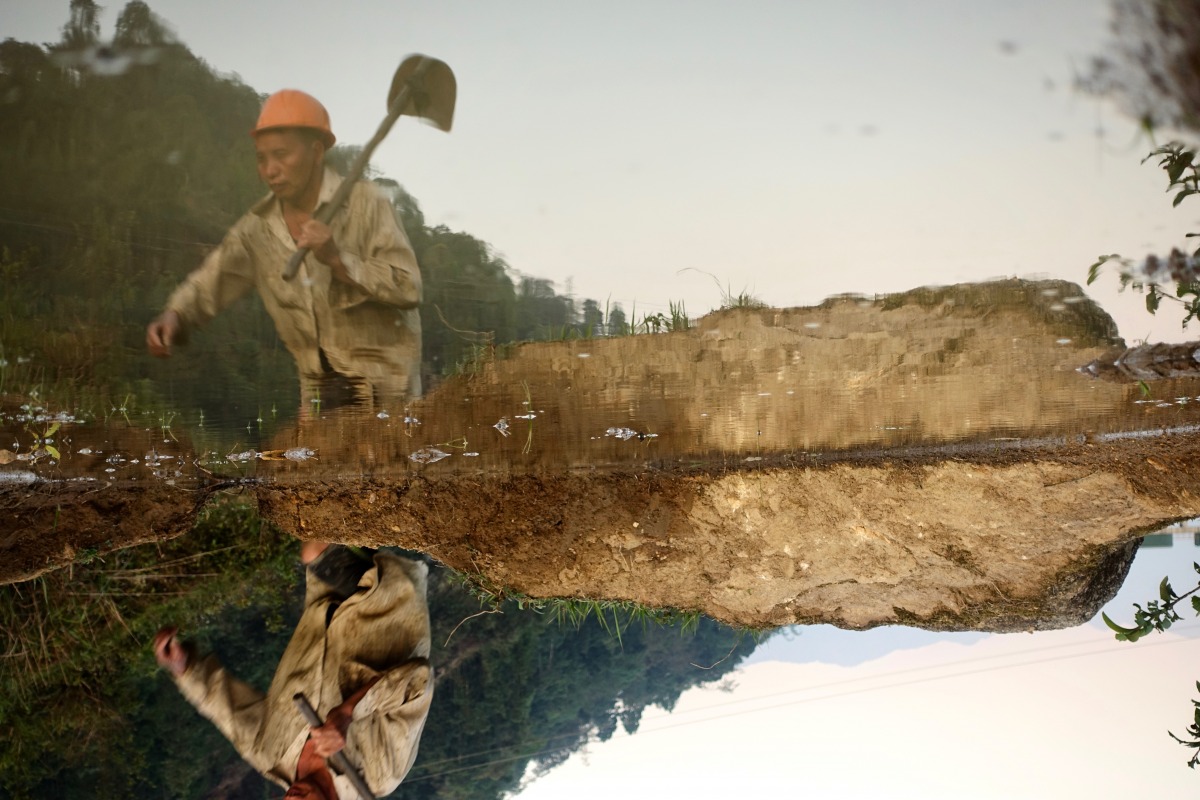
The Ephemeral Answer
I finger translate that to the family. It takes some effort. They smile and keep bending. I show them my camera and the father points his thumb to heaven. I smile and bend and shoot their ephemeral reflections on the water until the sun goes down.
Then I ask them for a phone number to send them the shots and have a chat. I tell them I’d like to write the story of the Hmong tourist guides coming back to work the paddy fields after the virus. The daughter has the best English and passes me her contact details.
I know I won’t ever do it: it is only the dream of the dead journalist. I haven’t been here enough to come up with a meaningful subject to write about, so I keep producing abherrajournalist ideas.
Nonetheless the virus side effects are a subject in itself, one that is rewriting the universe and its laws, our way of living and disengaging physically from each other.
I would write five WhatsApps to the first five tour guides I encounter and none would quite answer. Journalist Shoreditch this is.
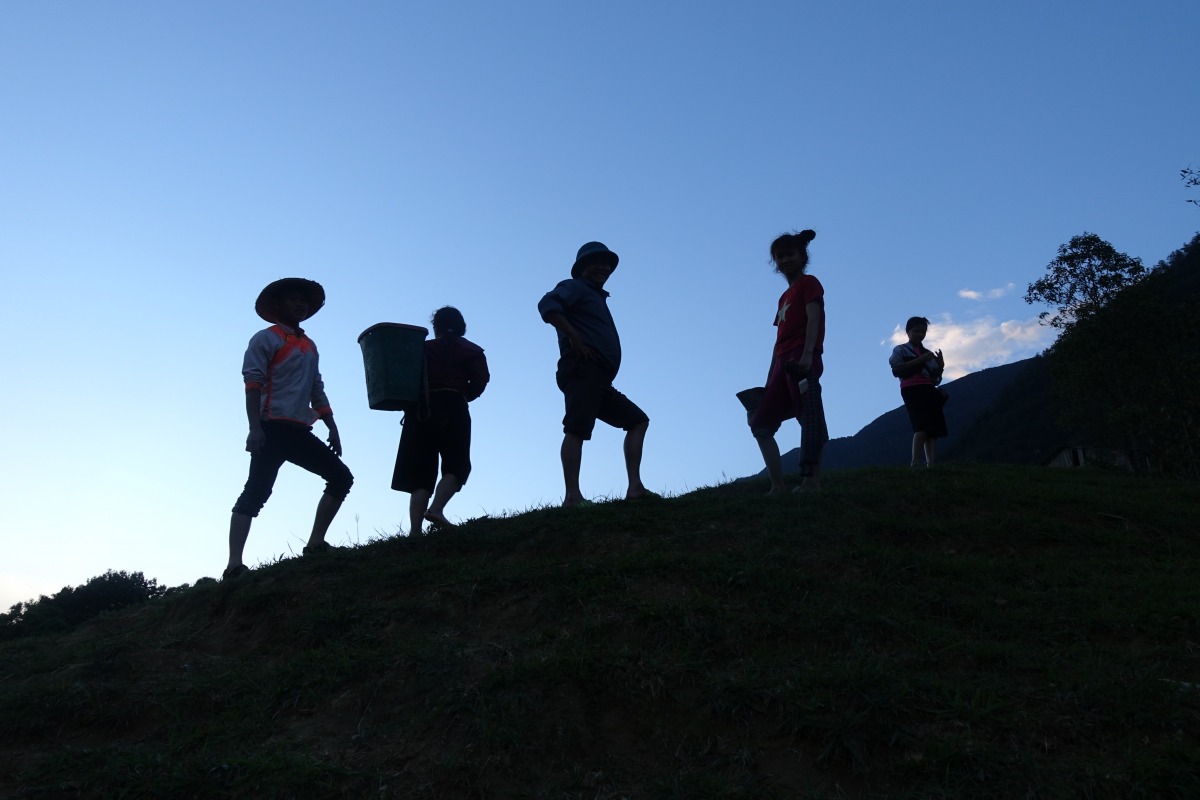
Tin Booming
I pay my respects to the family, jump on the scooter and keep riding up the road. After two minutes of ravenous ramps, distorted trees and clouds of midges avalanching my mouth, ears and nostrils, I encounter a second sunset, though this time the light dismays fast and darkness takes over.
I take a diversion through a skinny road, the dam growing smaller underneath, an awkward tin house with a blasting soundsystem on top a hill to my left hand side. There are puddles everywhere, and I keep dismounting and shooting, while the volume keeps rising, encircling the hillside, resonating in the suddenly emerald waters, now darker than ever under a starless sky.
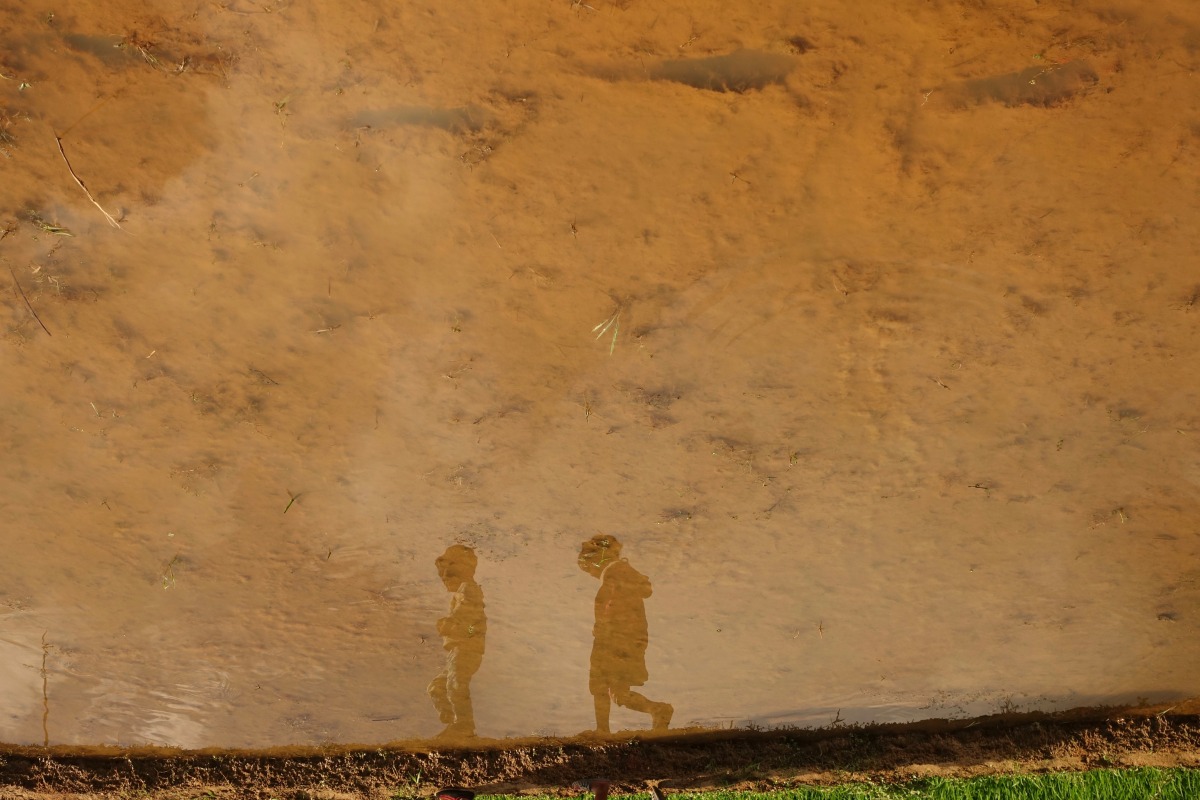
After messing a bit with the water and the finger clicking, a silhouette emerges from the tin house; then a second one; and then a third and a fourth. I can’t help but recall The Chainsaw Massacre, the four silhouettes sporting what seem to be blue overalls and hillbilly hats, though the music is nothing like hillbilly; it seems to be another bastard take on reggaeton.
I wave at the silhouettes but the silhouettes don’t wave back, their hands resting on their hips. It is chilly now and I’m just wearing a likely child-labour-made shirt and my skirt, all covered in mud.
Smells like dead rats.
I jump on my scooter, turn the engine on and fuck off. Ten metres on I notice a glow and hear a blasting sound that has nothing to do with the music. The explosion shines the valley and echoes all over the branches and waters, swirling and twisting like a frantic cloud of deathcore midges. I gulp and accelerate. A second detonation follows and then a third one. The roads are thinning, and my breath under the mask produces a reek of my own carbon dioxide that intoxicates me even more.
I keep driving frantically all over the place until I encounter a Hmong village resting on top of a hill. A Tannoy sound system seems to be broadcasting the voice of a preacher. I get closer. There seems to be some kind of religious ceremony going on, swarms of Hmongs gathering under a corrugated iron roof.
I wonder if I’ve just been hit and this is my funeral.
They look at me in awe and I smile wondering if the sparkle in my eyes would translate what my mask is failing to express —only a few people look like they are not pissed off and/or fatally ill with their masks on. Next thing a talking hand tells me to move on. It is a robust coppery hand, a lyrical twist on the iron fist.
I do as I’m told and the one-way road brings me further into the settlement, an uneven land of paddy fields and makeshift shacks where chickens, buffalos and goats pace around as if they are in Utopia.
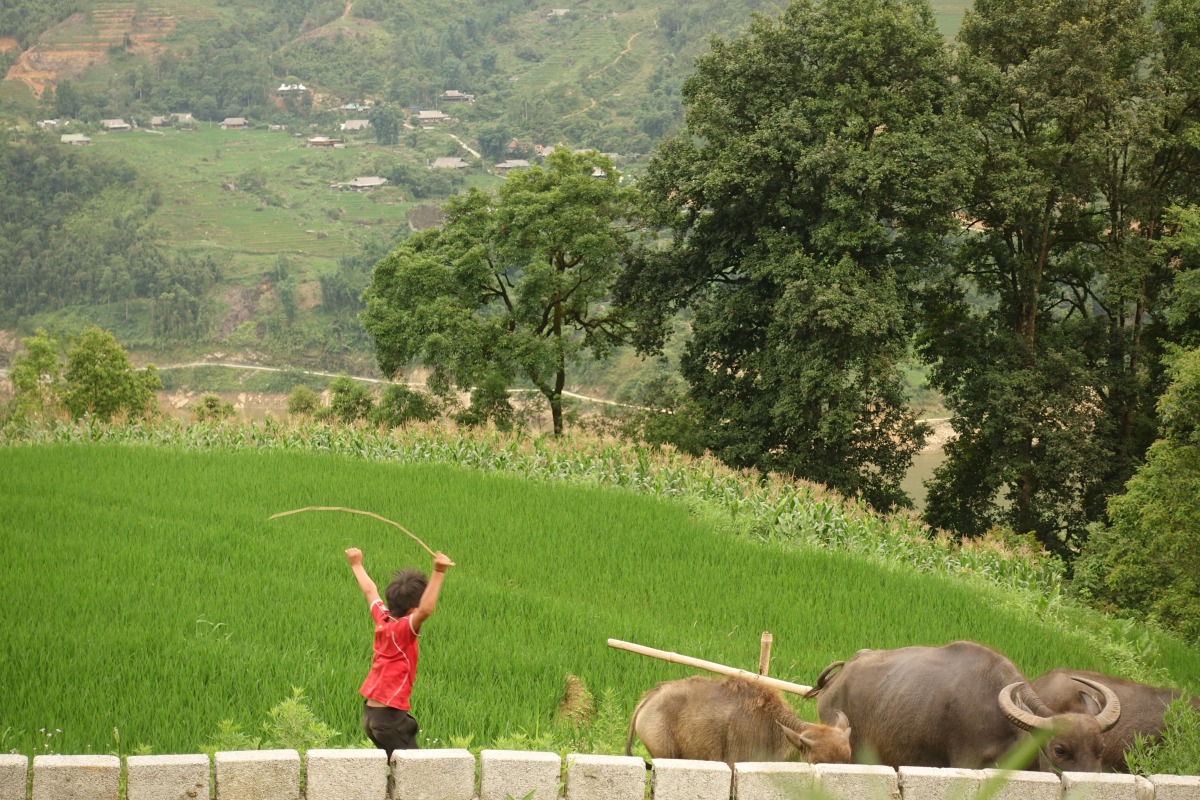
Walloped Knickers Rainbow
I wind up at the entrance of a house, its front surrounded by a display of hanging clothes, a walloped knickers rainbow. I stop by a steep slope and catch my breath. I remove my helmet and mask and breath the night air not quite knowing where I am, still pulsing, the echo of the shots travelling up my thighs, adding its throbbing chords to Boris Johnson’s bastard drumming. Then I hear the powerful sound of an engine and a motorbike stops right by my side.
“Are you lost”?
I look up and I see Ho Chi Minh.
“Since the 80’s”.
“Good for you” he says with a broad smile.
He is sporting stripped jean shorts and a sleeveless t-shirt that reads: “Dreams start here”.
“I’m eager to chase the dream”
“Ha! Good for you. You are not lost anymore. I’m driving back to my partner’s bar, you’ll love him. It is a ten-minute ride from here. You are welcome to follow us,” he says.
“You’ll be alright with us. We love to get lost as well”, says a voice rising from the back seat.
I’m stunned.
Ho Chi Minh reincarnation has wide bones and broad shoulders and a steel jaw, a Bermuda Triangle that turns his passenger into a blind spot.
Her head peers from under his shoulders and she says her name is Sam. Her smile could also alter humanity’s course.
“Let’s get lost” I shout.
And a cloud of dust swallows us.
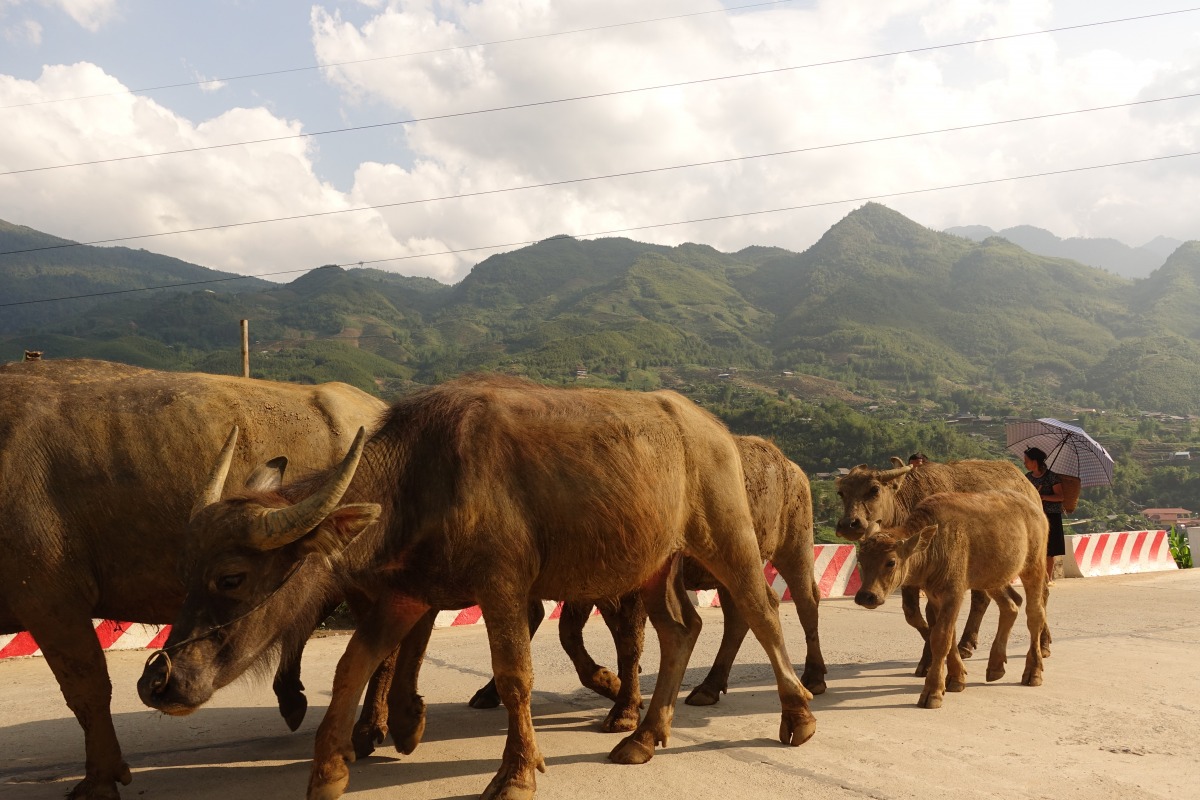
Titanic Apocalypse
Ho Chi Minh drives a motocross bike from the 50’s. It makes sense. The engine is modern and its wheels and suspension much more functional than my own. I follow them through bumpy roads, waving puddles everywhere, plus cracks and dogs and frogs and buffalos guided by umbrella-blooming-shepherd children, grocery-local-shops heaping up in columns of raw meat and cigarettes and rice wine, on the shore ditch.
Sam lifts herself up on the back seat, spreads her arms in the air, and her slim body arches the arrows of joy. Buddha is smiling on top of Fansipan, its toes rubbing her arms. This could be a cheesy mountain take on Titanic though it is more like the happy epilogue to Apocalypse Now.
Ho Chi Minh drives fast and she turns around and grins and finger grammars; her hands are saying all this is yours, us; plus we are alive, life is a dream. She seems to embody Ho Chi Minh’s t-shirt inscription … And yes, her smile could alter the course of humanity as much as her boyfriend’s pipe’s exhalation could coat my lungs into underground for eternity. It is all a balancing act.
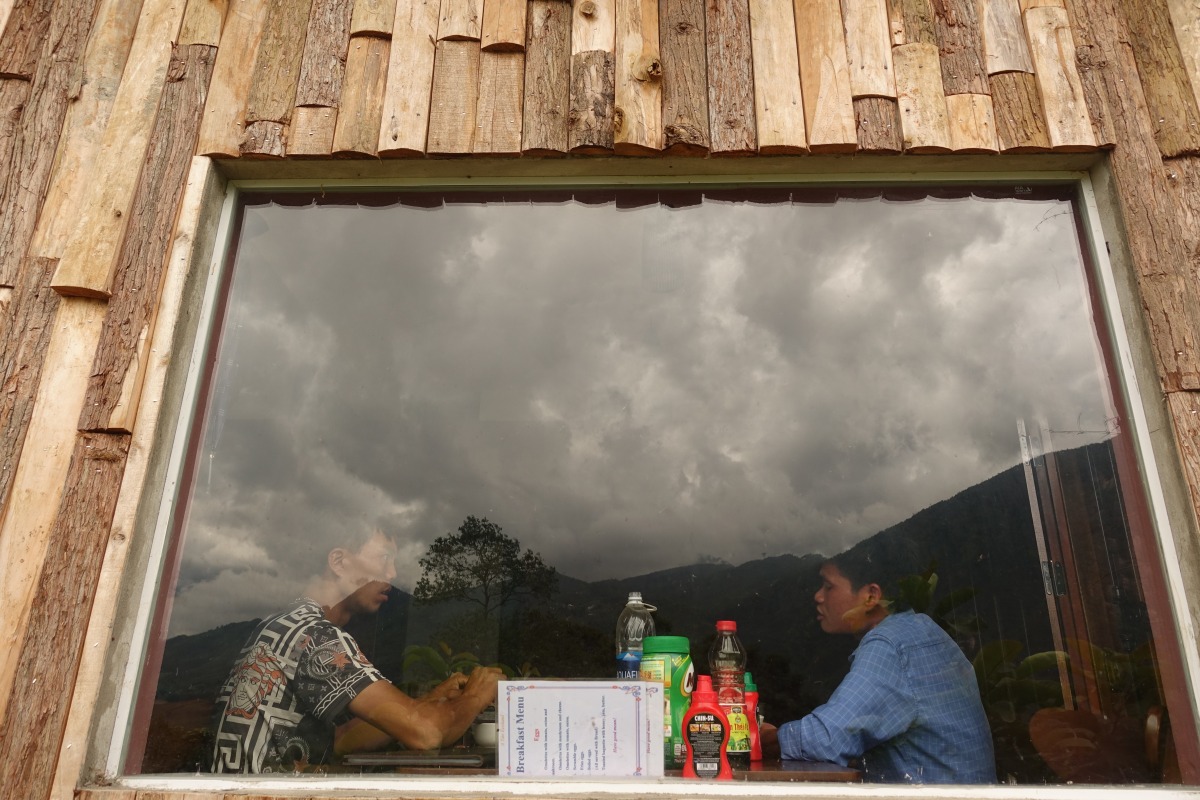
From Sapa to Norfolk by Bike
The ride will take us to Lock’s saloon where I’ll met him for the first time and find out that he and Ho Chi Minh are business partners, a couple of freedom outcasts building the foundations of the ultimate kingdom against the invisible massacre.
We share a few beers and play some songs before the big Wednesday, small candles igniting up the last shore, Ho Chi Minh is arranging the space and its lights, every corner and window softly setting up the lonely and humble stage of the end of Catalonelyness.
Ho Chi Min was also a tour guide before the disgraced beer, and still runs a wild homestay resting on top of a steeped hill five minutes drive from the bar. The homestay is named after his t-shirt, and offers private rooms and three bungalows spreading upstream from the river that crosses the valley.
Lock tells me he has been playing Irish punk traditional music for the last ten years, mainly in Hanoi, Hong Kong and Yangon. I cheer to that. His coast is humble and welcoming, his smile the ultimate shore.
My compass points towards his library, the small and shy and yet magnificent destiny running along the back wall, an island swiftly becoming our continent, its jackets our coats, its pages the map of an instant brotherhood lit upside down, sideways and beyond.
It feels like engaging in fire underwater, such an otherworldly flame it is.
The waves are breaking furiously, its foam producing light, life, cells, torches; plus some breeze, the ultimate shade. We could swim this waters forever, neatly sealed, like the shore to the ocean, like the path to our footprints, the fire next time and this one, its flame never stolen, its warmth lapping, kissing, and embracing the unlikely encounter of a lighter and its sparkle.
Lock is a well-travelled man, a wild punk trad player that left England when he was eighteen. He tells me he has lived in Burma, Thailand, China, Hong Kong, Cambodia and Vietnam. I inevitably ask for his recent adventures. He tells me that two years ago he rode a bicycle from Sapa to Norfolk, his English home, an eighteen month odyssey that he has almost finished writing about over the last two weeks, while quarantining after performing a visa run to Thailand.
I wonder how tough it might have been to be in an isolation camp.
“What at you talking about? I was taken into a nice hotel, it felt more like being with The Pogues backstage. I loved it. I was down to my last pennies and got fed three times a day by the same chef that would sell me one dollar Valiums and shots of whiskey every night. The weird thing was that every morning this doctor would knock at your door to check your temperature. Mine was 28 degrees for the two first mornings. He wrote it down, said it was fine and never came back. I was dead. It was sweet.”
His smile runs halfway between Dylan’s grannie and Jane Harlow’s, and it has the cheeky intensity of Shane McGowan’s. I look outside, The Pogues blasting, and I can see Buddha crystal clear, his dimples pierced by clouds and rain and sunshine, his toes playing with the water buffalos, the paddy fields like the dream-like sculpture where John Cage could have ultimately disappeared into utter freedom.
For the first time since I got my heart smashed like puddle rubble life is a miracle, a mighty dream. My syndrome is embraced, my roofless top covered.
(…)
Every man I see
In October-coloured weather
Seems to say to me
“I was once your father.”
And yet, he could be my son.
